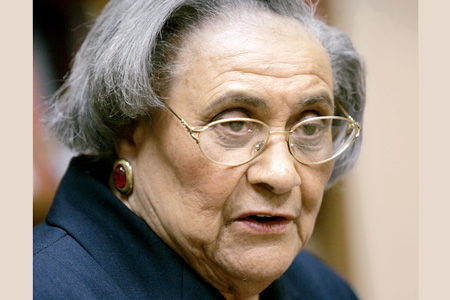
SECRET BI-RACIAL DAUGHTER–This Jan. 31, 2005 file photo shows Essie Mae Washington-Williams during a book signing in Washington. Washington-Williams, the daughter of one-time segregationist Sen. Strom Thurmond who kept her parentage secret for more than 70 years to avoid damaging his political career, died Monday, Feb. 4, 2013. She was 87. (AP Photo/Lawrence Jackson, file)
by Meg Kinnard
Associated Press Writer
COLUMBIA, S.C. (AP) — Essie Mae Washington-Williams, the mixed-race daughter of one-time segregationist Sen. Strom Thurmond who kept her parentage secret for more than 70 years, has died. She was 87.
Vann Dozier of Leevy’s Funeral Home in Columbia said Washington-Williams died Sunday. A cause of death was not given.
Washington-Williams was the daughter of Thurmond and his family’s Black maid. The identity of her famous father was rumored for decades in political circles and the Black community. She later said she kept his secret because, “He trusted me, and I respected him.”
Not until after Thurmond’s death in 2003 at age 100 did Washington-Williams come forward and say her father was the white man who ran for president on a segregationist platform and served in the U.S. Senate for more than 47 years.
“I am Essie Mae Washington-Williams, and at last I am completely free,” Washington-Williams said at a news conference revealing her secret.
She was born in 1925 after Thurmond, then 22, had an affair with a 16-year-old Black maid who worked in his family’s Edgefield, S.C., home. She spent years as a school teacher in Los Angeles, keeping in touch with her famous father.
While Thurmond never publicly acknowledged his daughter, his family acknowledged her claim after she came forward. She later said Thurmond’s widow, Nancy, was “a very wonderful person,” and called Strom Thurmond Jr. “very caring, and interested in what’s going on with me.”
Paul Thurmond, a South Carolina state senator and son of Strom Thurmond, said in an email to The Associated Press, “I was sorry to hear of the passing of Ms. Washington-Williams. She was kind and gracious and I have the greatest respect for her, her life and her legacy.”
Washington-Williams was raised by Mary and John Washington in Coatesville, Pa. When she was 13, Mary Washington’s sister, Carrie Butler, told Essie Mae that she was her mother.
Washington-Williams met Thurmond for the first time a few years later in a law office in Thurmond’s hometown of Edgefield.
“He never called my mother by her name. He didn’t verbally acknowledge that I was his child,” Washington-Williams wrote in her autobiography, “Dear Senator: A Memoir by the Daughter of Strom Thurmond.”
“He didn’t ask when I was leaving and didn’t invite me to come back. It was like an audience with an important man, a job interview, but not a reunion with a father,” she said in the book released January 2005.
It was the first of many visits between Washington-Williams and her father.
He supported her, paying for her to attend then-South Carolina State College at the same time Thurmond was governor. He also helped her later after she was widowed in the 1960s.
“It’s not that Strom Thurmond ever swore me to secrecy. He never swore me to anything,” she wrote. “He trusted me, and I respected him, and we loved each other in our deeply repressed ways, and that was our social contract.”
Washington-Williams watched from afar as Thurmond ran for president as a segregationist for the Dixiecrat Party in 1948, saying “all the laws of Washington and all the bayonets of the army cannot force the Negro race into our theaters, our swimming pools, our schools, our churches, our homes.”
Washington-Williams recalled once asking her father about race.
Thurmond defended his beliefs as part of the “culture and custom of the South,” she wrote.
“I certainly never did like the idea that he was a segregationist, but there was nothing I could do about it,” Washington-Williams said in 2003. “That was his life.”
Thurmond later softened his political stance and renounced racism. But he never publicly acknowledged his oldest daughter or the active role he played in her life. Thurmond and his first wife, Jean, were married in 1947; she died in 1960. They had no children. He had four children with his second wife, the former Nancy Moore, whom he married in 1968.
Washington-Williams was left unsettled by her father’s death. At her daughter’s encouragement she decided to make her story public.
“In a way, my life began at 78, at least my life as who I really was,” Washington-Williams wrote. “I may have called it ‘closure,’ but it was much more like an opening, a very grand opening.”
A statue of Thurmond on the Statehouse lawn was originally cast saying he had four children. Thurmond’s family agreed to have Washington-Williams’ name added.